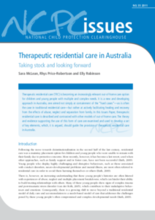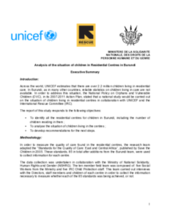Displaying 1301 - 1310 of 1510
This paper from Monographs of the Society for Research in Child Development Volume 76, Issue 4 proposes a number of key components for translating research into policy and programs: analyzing the situation, using evidence to build the case for action, developing policies, building program capacity in child welfare and early childhood development, creating a family‐based child welfare system, and developing a system of monitoring and accountability.
This chapter from Monographs of the Society for Research in Child Development Volume 76, Issue 4 reviews the neurobiological literature on early institutionalization that may account for the psychological and neurological sequelae discussed in other chapters in this volume.
This monograph contains nine chapters that review and discuss the empirical literature on the development of children who have been deprived of their permanent parents
This chapter from Monographs of the Society for Research in Child Development Volume 76, Issue 4 reviews sensitive periods in human brain development based on the literature on children raised in institutions.
This study explores global growth suppression among children within institutional care settings.
The study explores the post-care experiences of young Jordanian care leavers. Material struggles were similar to peers internationally. The distinct difference for Arab care leavers was the cultural influence. Patriarchy, family life and collectivism impact the care leavers' experiences. A cultural dimension increases understanding of leaving-care.
This paper discusses findings from a qualitative longitudinal study which explored the process of leaving long-stay institutional state care in Romania during 2002–4, a period at the heart of accelerated EU-enforced childcare reform.
The aim of this article is two-fold. Firstly, to present a critical discursive analysis of young people's accounts of themselves in the transition from care. Secondly, to shed light on three different ways of making the transition from care; transition through a break with the past after moving out, transition through continuing change and transition as a way of dealing with the risk of further problems in their lives.
This is an article about therapeutic residential care. Therapeutic residential care (TRC) is becoming an increasingly relevant out-of-home care option for children and young people with multiple and complex needs.
The report of this study responds to the objectives of identifying all the residential centres for children in Burundi, including the number of children residing in them; analysing the situation of children living in the centres and developing recommendations for the next steps


